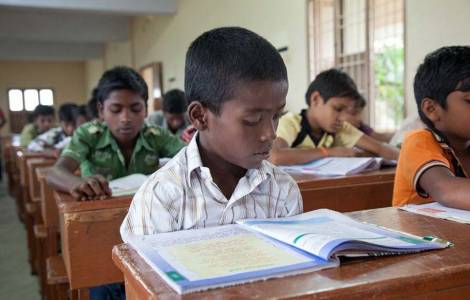
Internet
Azimganj (Agenzia Fides) - The town of Azimganj, in the district of Murshidabad, was an important commercial hub in the eighteenth century, home to many Jain temples that testify the glories of distant times. The Salesians arrived in this area in 1966 and are currently active in the field of education and parish and social activities. Among the various initiatives carried out since 1966 the religious opened the Don Bosco school with primary and junior classes.
Attended by minors coming from contexts of great misery, it welcomes children mainly of tribal origin or belonging to the lower castes and in contexts of total deprivation. In many cases, underlines the note sent to Fides, they were born from undernourished mothers and were undernourished children, a factor that has caused so many of their cognitive delays. They live in poor huts without electricity or toilets. Parents cannot even pay tuition fees that amount to one euro a month. Most students belong to the Santhal ethnic group.
The children who attend Don Bosco are the first of their family to go to school, and this triggers a series of problems. First of all, nobody is able to help them with their homework; secondly, there are many parents who prefer to send them to work instead of pushing them to finish their studies, because they do not have the tools to understand how important education is to stop the vicious circle of ignorance and exploitation in which they were born .
The Children of Don Bosco do their utmost to help 1300 children who attend elementary and junior school. They have scarce means available, but very intelligent: to make up for the lack of blackboards, they have painted the walls black and write on them with chalk; students follow lessons sitting on the floor, because they do not have desks.
The need to buy chairs and desks, blackboards, shelves and books, audio-visual equipment to guarantee a minimum of dignity to students and teachers and to push the most problematic students to overcome difficulties, especially through the use of books, is ever more pressing as well as audio-video material that can stimulate learning and curiosity. (AP) (Agenzia Fides, 26/6/2018)